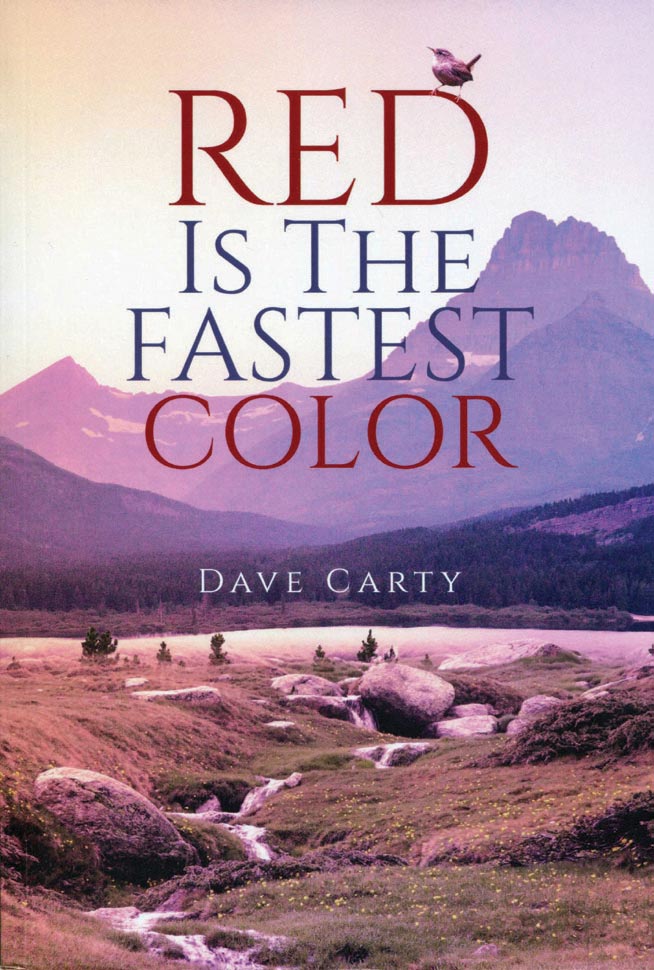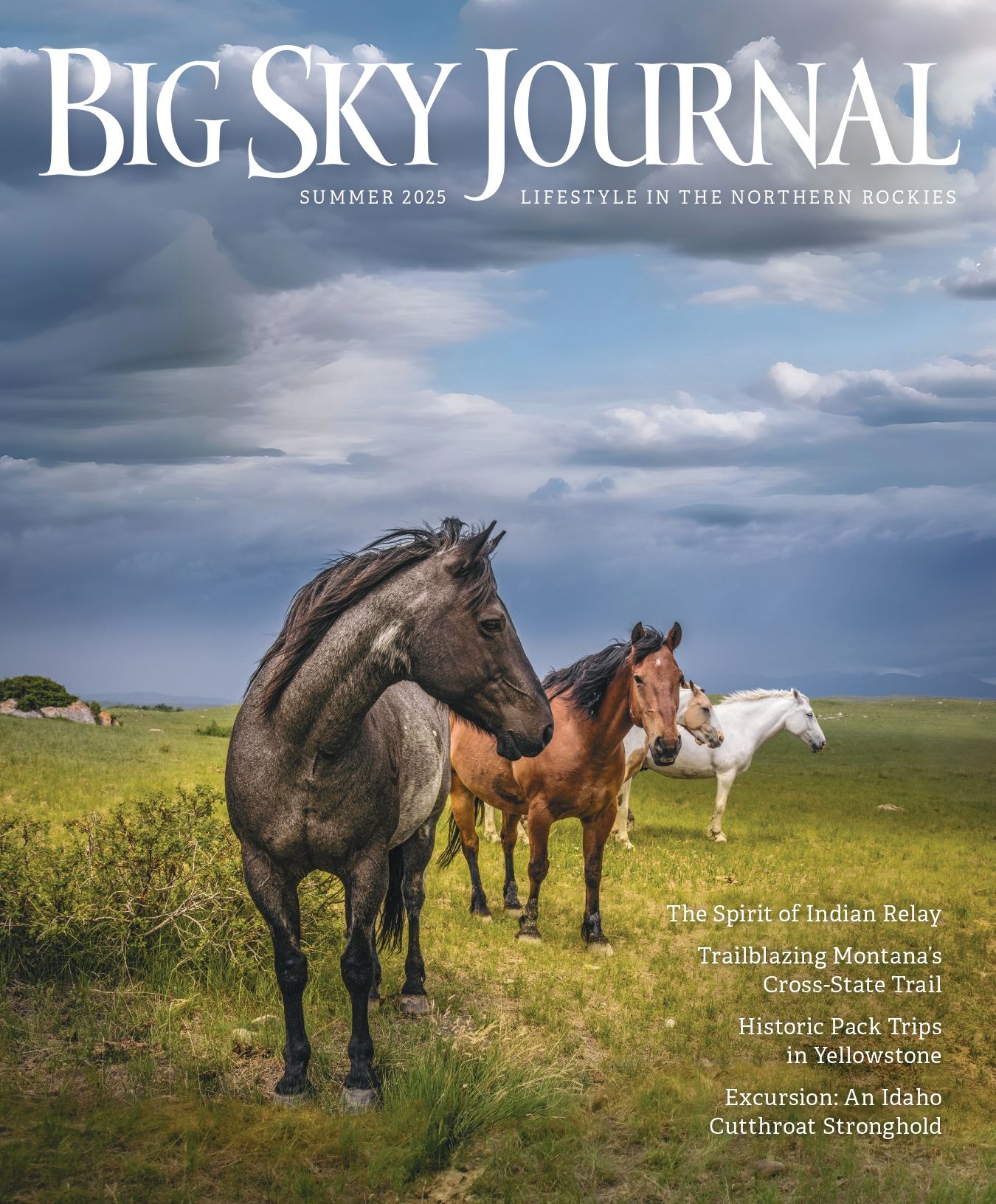
30 May Books: Reading the West
Dave Carty captures the spare poetry of Montana landscapes, specifically the Shields River Valley, in his poignant novel Red is the Fastest Color (Guernica World Editions, $18.95). He takes the reader through the seasonal changes that dominate life in this region, and those mirrored in the lives of his characters as they face a coming winter that seems to have no spring.
The trio of characters — Mona, her husband, Ben, and her brother, Jamison — are brought together by Mona’s decline into the ravages of Parkinson’s disease. Jamison reluctantly leaves his life in Minneapolis to move into a cabin on Mona and Ben’s land outside of the fictional town of Aden — fictional in name but familiar enough to anyone driving Highway 89 north of Livingston. Mona asks him to uproot himself and come assist her and Ben, the latter of whom “won’t ask for help, he never will.”
Once there, the outsider slowly transforms into an insider as Jamison learns to accept this rural community and its ways of approaching life and death. He and Ben slowly find commonality and brotherhood, even as the person who binds them together fades into nonexistence. His life is re-created as he finds himself while losing a beloved family member.
Against this backdrop of looming death, the lives of these characters take on a bold joy and deep purpose, like fresh paint strokes added to a mural fading into the worn brick of a small-town bar. As readers, we can be grateful for being invited to witness the renewal life can find in the midst of sorrow.

Craig Johnson takes readers back to Walt Longmire’s pre-law enforcement days in First Frost (Viking, $30). This new installment of the big sheriff’s wildly popular mystery tales is, in essence, the hero’s origin story — examining the early events that forged a consummate puzzle-solver and lawman out of a Western kid who reveled in California’s college football and surfer scenes before heading off to Vietnam.
On the way to the recruitment center, Longmire and his best friend, Henry Standing Bear, find themselves stranded in the unwelcoming locale of Bone Valley, Arizona — a town with a dark past kept hidden by an equally dark present. A roving pack of menacing characters threatens their every move as they find themselves drawn into a mystery centered on the site of a former World War II detention camp for Japanese Americans in one of America’s darkest moments: the racially motivated and baseless imprisonment of over 125,000 people, two-thirds of whom were American citizens, in the wake of the attack at Pearl Harbor.
With the Longmire series, Johnson continues to spin compelling and exciting tales of mystery and the dark sides of humanity. But it is his passion for social justice and honoring the struggles of the downtrodden that elevates his books beyond ordinary fiction. Whether the horrors of Native American boarding schools, victims of corporate malfeasance, the epidemic of missing and murdered Indigenous women, or, now, the unconstitutional and unconscionable crimes committed by our government against Asian Americans, these novels grapple with important issues that leave the reader better informed, more compassionate, and, one hopes, moved to action, all the while never slipping into a hint of didacticism that would remove the reader from the spellbinding and heart-racing story that unfolds with a superb mastery of the craft.
First Frost is a welcome addition to the Longmire canon.
Of Note

Rick Bass offers his insights into the multifaceted aspects of the natural world — including the human animal, either in sync or at odds with this world — in his new collection, With Every Great Breath: New and Selected Essays, 1995 – 2023 (Counterpoint, $28). With the eye of a scientist and the heart of a poet, Bass examines our place on the planet with precision, empathy, and a richness of spirit that will invite comparisons to Aldo Leopold, Annie Dillard, and Lewis Thomas. With this book, he further cements his legacy as one of the most important nature writers of the generation and beyond.

Poet Henrietta Goodman explores all the mythic and mysterious places of her inner world in Antillia (Backwaters Press, $17.95). The title of this intoxicating collection refers to a 15th century phantom island. In each of these poems, Goodman gives voice to myriad ghosts of memory, family, love, and pain, with prose crafted through the instruments of the heart, mind, blood, and bone. Readers of this collection will have a hard time shaking the image of Antillia from the horizon of their thoughts, and they will be grateful for the haunting.

Montana’s past and present take an unexpected twist through the skilled lens of Richard S. Buswell in The Quest: A Montanan’s Photographic Journey (Montana Historical Society Press, $29.95). Every page of this beautifully wrought book invites the viewer to see the familiar in a striking new way. From a rusted coffee can to dashboard instruments, from details of old machinery to the toe of a boot, Buswell’s black-and-white, hyper-realist photographs reveal the magic in the mundane and the delight in the discarded vestiges of the West.

Norman Maclean’s A River Runs Through It and Other Stories is one of a handful of books that defines Montana for many readers. Now, the life of this beloved storyteller is immortalized in Rebecca McCarthy’s personal remembrance, Norman Maclean: A Life of Letters and Rivers (University of Washington Press, $29.95). As a child visiting Maclean in Seeley Lake, Montana and as a student at The University of Chicago, McCarthy was taken under the writer and professor’s wing, where he nurtured her toward becoming the writer she is today. McCarthy’s portrait expertly blends personal recollections with a journalistic examination of the correspondence and other writings that Maclean produced throughout his life and career. Readers will find a wealth of insight into the creative output and encompassing world of this acclaimed author.

In Gerald Wagoner’s collection of poetry, When Nothing Wild Remains (Broadstone Books, $22.50), one finds the silences and distances of memory spread out on the open landscapes of Montana and eastern Oregon. Each poem is like a small painting one might find tucked away in a dead relative’s attic or hanging above the bar in a single-stoplight town. Wagoner brings these painted relics into the sunlight, and we see that their colors haven’t faded in the least despite all the years they’ve been patiently waiting for us. It’s impossible to read these poems and not utter the name “Richard Hugo.” That great chronicler of the rural West has a kindred spirit in Wagoner.
Marc Beaudin is a poet, theater artist, and bookseller based in Livingston, Montana. He has contributed to numerous publications, written three books — These Creatures of a Day, Life List: Poems, and Vagabond Song: Neo-Haibun from the Peregrine Journals — and his work has been included in anthologies dedicated to environmental and social justice.




No Comments